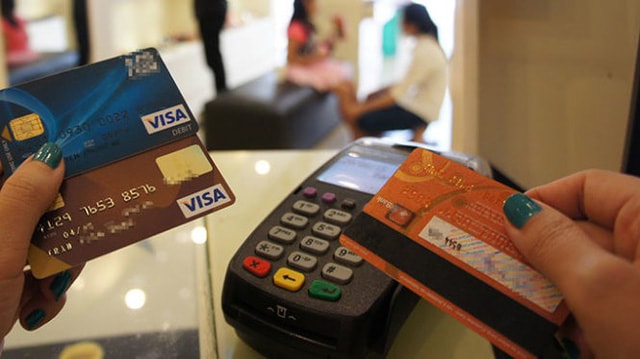Pretending to be a bank employee to invite people to open a card to cheat money
There is a phenomenon of some people impersonating bank employees, creating websites or using social networks to approach customers who want to open a card or need money, then charge a fee of 5% to 10% of the credit card limit.
Maritime Bank has just issued the above warning. According to this Bank, recently there have been a number of individuals impersonating employees of several banks, including Maritime Bank.
These subjects create websites or use social networks such as Facebook, Viber, Zalo to reach customers.
 |
| Banks warn against impersonating bank employees to trick people into making credit cards. |
To create trust, they give out (fake) employee cards and guide customers through the steps of applying for a bank card, such as filling out the application form and sending documents such as: ID card, household registration, labor contract and some other documents via social networks.
They then proactively called customers using different mobile phone numbers and pretended to be other departments of the bank re-verifying customer information.
Then the card issuance result information with photo of fake card and PIN code issuance form will be sent to the customer to create absolute trust.
During the card making process, the subjects also agreed with customers that the card issuance fee was 5% to 10% of the total credit card limit.
When it comes time to notify the customer that the card has been issued, they ask the cardholder to transfer a fee before sending the card home. The fee is usually required to be transferred to some personal account at another bank.
After receiving the money, the phone numbers that were contacted lost signal and customers could not connect with them on social networks.
This is not the first time banks have warned about fraud. Previously, a series of banks have spoken out about other fraudulent tricks of criminals such as asking customers to open accounts/cards, registering for e-banking services and buying them back at high prices; in order to use them for fraudulent purposes, withdrawing cash abroad or transferring money.
There are cases where people pretend to be acquaintances abroad, ask to receive money transfers and instruct customers to log in to fake links and websites or ask customers to download malicious applications, thereby stealing usernames, passwords, and OTP authentication codes.
In many cases, they even impersonate police officers, prosecutors or bank security officers to call and inform customers that their accounts have been hacked by criminals and ask for account numbers and transaction passwords.


